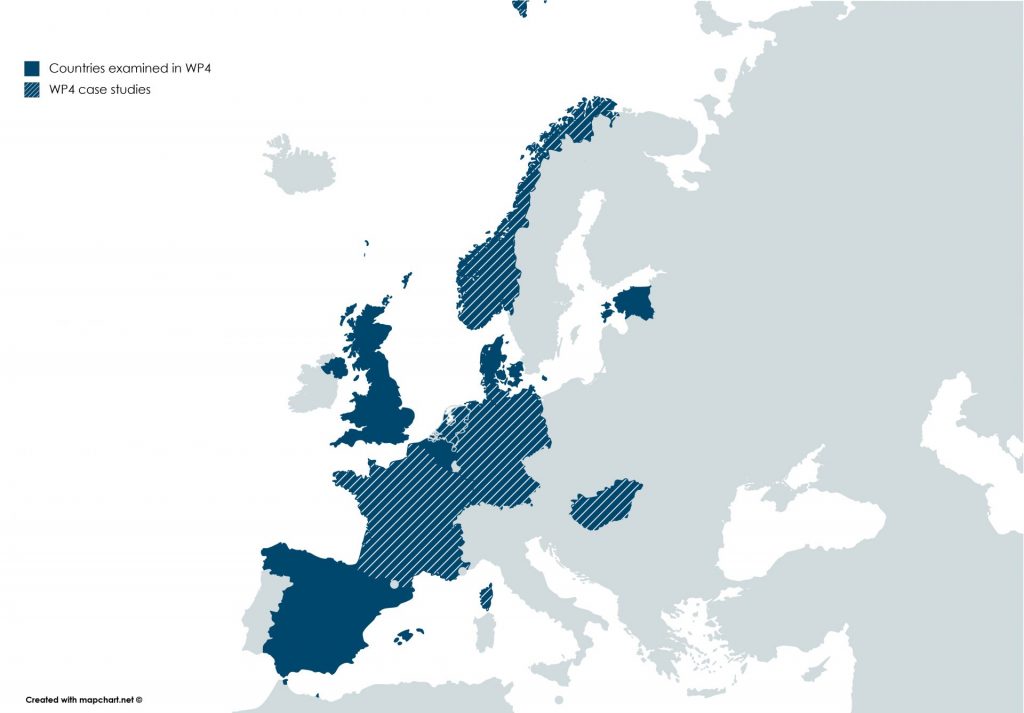Practices of Internal Collaboration for Policy Design (Work Package 4 – WP4)
Led by the University of Potsdam (Germany), this work package is conducting research from April 2018 to May 2021.
The WP4 team studies the emergence and nature of innovative collaboration in policy design inside governments. A special emphasis is given to the role of governments and the relevance of ICT in intra-and intergovernmental collaboration. Three main research questions are investigated:
- How do ICT affect policy design inside governments, and have they led to innovative collaboration practices?
- What are the main drivers and obstacles for such practices?
- How do institutional, organizational, and individual features shape the implementation of innovative collaboration practices within governments?
To answer these questions, the WP4 team has focused on:
- Actor constellations and actors' capabilities,
- Collaboration means, especially the application and suitability of ICT,
- Institutional and governmental conditions shaping actors and means and their inter-linkages.
Research
The WP4 team first conducted an inter-disciplinary academic expert survey, examining digitalisation and collaboration in European governments and involving social scientists, legal scholars, historians, and economists with a special competence to assess such questions. Covering ten countries, the survey focused on the experts' perceptions and assessments of internal policy design, i.e. the structures and processes to formulate government policies within government organisations, with a special emphasis on perceptions of the role of novel and innovative ICT tools as means for executive collaboration. It analysed the impact of digitalisation for policy design, presented expert assessments of portfolio salience, and discussed the role of delegated agencies in providing expertise and internal policy design. It thus aimed at complementing existing 'governance indicators' and shedding light on collaboration and digitalisation dynamics from a comparative perspective. See D4.2 Research Report - Academic Expert Survey.
Next, the WP4 team conducted comparative in-depth case studies across five European countries (Germany, France, Hungary, Netherlands, and Norway) based on a joint analytical framework using semi-structured expert interviews and document analysis. Based on the five case studies, the researchers analysed the means (e.g. technicalities) of the initiatives, their set-up conditions, actors involved, and their role in the decision-making process. The case study report analyses the scope, formality and intensity of these initiatives as well as their direct and indirect effects on decision-making and their parent organisations. See D4.3 Comparative Case Studies.
Empirical observations and implications resulting from the academic expert survey and the comparative case studies have been summarized in a Policy Brief, underlining key findings, practical implications, and recommendations. See D4.4 Policy brief - Innovative collaboration for policy design through ICT.
Results and findings
Our results illustrate the importance of ICT tools in the public sector for innovative and collaborative policy design. ICT tools contribute to increasing exchange and processing of information, support the harmonisation of administrative processes and facilitate professional exchange within public sector organisations and with external actors. ICT tools may also affect formal lines of responsibility in policy-making, however, the effect of ICT on formal institutions is less pronounced in countries with strong formal responsibilities (e.g. Germany, Scandinavian countries). Apart from the countries’ respective administrative tradition, effects of ICT tools on policy design are shaped by (1) the set-up conditions, for example, whether the use of the tool is mandatory or not, (2) the behaviour of the actors involved, for example, whether they are motivated to use it, and (3) their means, i.e. the design characteristics and technical properties. Also, tools and their support structure need sufficient organisational, financial and political support. To achieve successful implementation, the expertise of a digitalisation agency may be beneficent. See D4.2 Research Report - Academic Expert Survey, D4.3 Comparative Case Studies and for a brief summary D4.4 Policy brief - Innovative collaboration for policy design through ICT.
Scientific publications
Work Package 4 includes the publication of two upcoming journal articles.
The team
Under the leadership of the University of Potsdam (Germany), the following institutions have assembled a large team: Cardiff University (the UK), Central European University (Budapest, Hungary), French National Centre for Scientific Research (CNRS)/Grenoble Institute of Political Studies (France), Hertie School (Berlin, Germany), KU Leuven (Belgium), Roskilde University (Denmark), Tallinn University of Technology (Estonia), University of Antwerp (Belgium), University of Bergen (Norway), University of Louvain (Belgium), and University of Zaragoza (Spain).


























